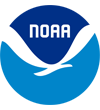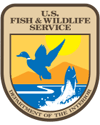|
Papahānaumokuākea Marine National Monument Hawai'i |
 |
 NOAA photo | |
The name Papahānaumokuākea commemorates the union of two Hawaiian ancestors – Papahānaumoku and Wākea – who gave rise to the Hawaiian Archipelago, the taro plant, and the Hawaiian people.
Papahānaumokuākea Marine National Monument is the largest contiguous fully protected conservation area under the U.S. flag, and one of the largest marine conservation areas in the world. It encompasses 582,578 square miles of the Pacific Ocean (1,508,870 square kilometers) - an area larger than all the country's national parks combined.
The Northwestern Hawaiian Islands Marine National Monument was established by Presidential Proclamation 8031 on June 15, 2006 under the authority of the Antiquities Act (16 U.S.C. 431-433). It was expressly created to protect an exceptional array of natural and cultural resources. A year later, it was given its Hawaiian name, Papahānaumokuākea.
Nature
The 1,350 mile stretch of coral islands, seamounts, banks and shoals supports an incredible diversity of coral, fish, birds, marine mammals and other flora and fauna, many of which are unique to the Hawaiian Island chain. Many of the islands and shallow water environments are important habitats for rare species such as the threatened green turtle and the endangered Hawaiian monk seal, as well as the 14 million seabirds representing 22 species that breed and nest there. Land areas also provide a home for four species of bird found nowhere else in the world, including the world's most endangered duck, the Laysan duck.
Culture
Papahānaumokuākea is of great importance to Native Hawaiians, with significant cultural sites found on the islands of Nihoa and Mokumanamana, both of which are on the National and State Register for Historic Places. Mokumanamana has the highest density of sacred sites in the Hawaiian Archipelago and has spiritual significance in Hawaiian cosmology.
Papahānaumokuākea is also home to a variety of post-Western-contact historic resources, such as those associated with the Battle of Midway and 19th century commercial whaling.
World Heritage
On July 30, 2010, Papahānaumokuākea was inscribed as a mixed (natural and cultural) World Heritage Site by the delegates to the United Nations Educational, Scientific and Cultural Organization's (UNESCO) 34th World Heritage Convention in Brasilia Brazil. It is the first mixed UNESCO World Heritage Site in the United States and the second World Heritage Site in Hawaiʻ
Source: NOAA Website (May 2023)
Documents
2020 State of Papahānaumokuākea Marine National Monument: Status and Trends 2008-2019 (2020)
Accomplishments: 2009 • 2011 • 2013 • 2014 • 2016 • 2017 • 2018 • 2019 • 2020 • 2021 • 2022
Condition Report 2009: Papahānaumokuākea Marine National Monument (March 2009)
Creating the Papahanaumokuakea Marine National Monument: Discourse, Media, Placemaking, and Policy Entrepreneurs (©Heather Elizabeth McDowell Ward, October 2010)
Final Environmental Assessment, Papahānaumokuākea Marine National Monument (December 2008)
Forecasting the Impact of Storm Waves and Sea-Level Rise on Midway Atoll and Laysan Island with the Papahānaumokuākea Marine National Monument—A Comparison of Passive Versus Dynamic Inundation Models USGS Open-File Report 2013-1069 (Curt D. Storlazzi, Paul Berkowitz, Michelle H. Reynolds and Joshua B. Logan, 2013)
Known Maritime Heritage Resources (Date Unknown)
Management Plan, Papahānaumokuākea Marine National Monument (December 2008)
Map (undated)
Map (undated)
Map: Pō Ao (undated)
Maritime Heritage Research, Education, and Management Plan: Papahanaumokuakea Marine National Monument (October 2011)
Nā Hulu Aloha — A Precious Remembering: Origin stories of the Papahānaumokuākea Marine National Monument Native Hawaiian Cultural Working Group Kiamanu Sub-committee (Hōkū Cody, Umi Kai, Miki'ala Pescaia and Jen Waipa, extract from Parks Stewardship Forum, Vol. 38 No. 2, 2022)
Natural Resources Science Plan 2011-2015, Papahanaumokuakea Marine National Monument (April 2011)
Newsletter (Ku'i Ka Lono - News)
2021: February • June • October
2022: February • June • October
2023: February • June • October
Northwestern Hawaiian Islands National Marine Monument: A Citizen's Guide (September 2006)
Overview, Papahanaumokuakea Marine National Monument (undated)
Permitted Activities: 2009 • 2010 • 2011 • 2012 • 2013 • 2014 • 2015 • 2016 • 2017 • 2018 • 2019 • 2020
Proclamation 8031—Establishment of the Northwestern Hawaiian Islands Marine National Monument (George W. Bush, June 15, 2006)
Proclamation 8112—Amending Proclamation 8031 of June 15, 2006, To Read, "Establishment of the Papahanaumokuakea Marine National Monument" (George W. Bush, February 28, 2007)
Proclamation 9478—Papahānaumokuākea Marine National Monument Expansion (Barack Obama, August 26, 2016)
State of the Reserve: 2000-2005, Northwestern Hawaiian Islands Coral Reef Ecosystem Reserve (February 2006)
Superintendent Report (NOAA)
2009: January-March • April-June • July-September
Superintendent Report (USF&WS)
2009: March 13 • April 10 • May 8 • May • June • July • August • September • October/November • December
2010: January • February • March • October-November
Taxonomic determination of the cryptogenic red alga, Chondria tumulosa sp. nov., (Rhodomelaceae, Rhodophyta) from Papahānaumokuākea Marine National Monument, Hawai'i, USA: A new species displaying invasive characteristics (Alison R. Sherwood, John M. Huisman, Monica O. Paiano, Taylor M. Williams, Randall D. Kosaki, Celia M. Smith, Louise Guiseffi and Heather L. Spalding, extract from PLoS ONE, 15(7), July 7, 2020)
Ua pa'a nā kahiko: Ancient Names Remembered (Date Unknown)
Pāpahānaumokuā Marine National Monument - Where Nature and Culture are One
papahanaumokuakea/index.htm
Last Updated: 01-Jan-2025


